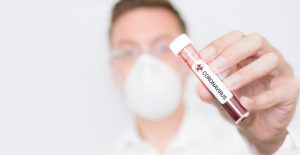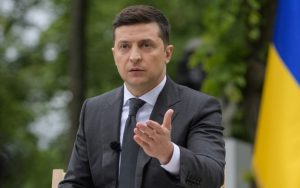
Pierre Louis Goudreaux’ painting “An Amorous Couple,” stolen by the Nazis during WWII, has returned to Ukraine, said Minister of Culture Oleksandr Tkachenko.
“This story is sad, but with a happy ending. The Nazis stole the painting from the museum’s storerooms in 1943. After the war, the painting appeared on the antique market. In 1953 it ended up in a private collection in the U.S. For 60 years ‘An Amorous Couple’ was put up for sale, but at the request of the owners – the Khanenko Museum – the sale was stopped,” Tkachenko wrote on his official Telegram channel on Tuesday, July 14.
The Minister of Culture of Ukraine invited everyone to visit the Khanenko Museum and see the masterpiece.
As previously reported, U.S. law enforcement agencies transferred the painting “An Amorous Couple” by Pierre Louis Goudreaux to Ukraine, stolen by the Nazis during World War II.
During the Second World War, the painting was stolen by the Nazis from Kyiv National Museum of Khanenko and subsequently ended up in the United States.

In Ukraine, as of Wednesday morning, 836 new cases of CVID-19 were detected, 977 people from among the previously sick recovered, 15 patients died, according to the website of the Coronavirus Epidemic Monitoring System of the National Security and Defense Council (NSDC).
A day earlier, on July 14, some 638 new cases of COVID-19 were reported, while there were 612 cases on July 13, 678 infected people on July 12, 800 new cases of the disease on July 11, and on July 10, there were 819 new registered infections. On June 26, an absolute anti-record was registered – 1,109 new infections.
The cumulative number of coronavirus cases reached 55,607 on Wednesday morning, including 28,131 recoveries and 1,427 deaths. The number of active COVID-19 cases currently stands at 26,049 in Ukraine, which is 156 less than the day before.
The largest number of detected cases of COVID-19 over the past day was recorded in Lviv region (171 cases) and in Kyiv (147 cases).

President of Ukraine Volodymyr Zelensky said that visa liberalization for tourists from China and India should be carried out as soon as possible.
According to the presidential press service, the head of the state said this at a meeting with the Cabinet of Ministers of Ukraine members on Monday, July 13, at which Foreign Minister Dmytro Kuleba said that the government is actively working on the issue of liberalizing the visa regime for tourists from these countries.

Entry for Ukrainians has already been opened in 25 countries amid coronavirus (COVID-19) disease, Ukrainian Foreign Minister Dmytro Kuleba has said.
“At the recent briefing, I announced 23 countries that Ukrainians could go to. There are 25 counties now. The Bahamas (I agree that it is distant place, but attractive for travelers) and Lebanon (less popular place for Ukrainian travelers) are added,” Kuleba said at an online briefing on Tuesday.
Earlier, the minister named 23 countries that Ukrainians can also visit: Turkey, Serbia, Albania, Northern Macedonia, Montenegro, Belarus, Great Britain, the United States, Mexico, Egypt, Tunisia, the Republic of Korea, Iraq, Iran, Afghanistan, South Sudan, Ethiopia, Somalia, Kenya, Zambia, Tanzania, Burundi and the Seychelles.
The minister spoke about the resource tripadvisor.mfa.gov.ua, which was developed by the Ministry of Foreign Affairs of Ukraine, where people can get the most complete information about which country and by what rules entry is allowed.
Kuleba spoke about the rules of entry into countries that are popular among Ukrainians.
“Turkey: it is necessary to undergo a medical examination at the border, in case of COVID-19 symptoms, do a free PCR test, have insurance policy for COVID-19 disease, you can buy it online or from a tour operator, or directly at the airport. Entry into Serbia is allowed without restrictions. The result of the PCR test or the obligation to pass a 14-day lockdown is necessary,” he said.
The foreign minister said that the condition for obtaining a permit to enter Croatia for those who are going for tourist purposes is also the presence of a confirmation of the booking the hotel or apartment.
“Entry into Montenegro is also a popular vacation destination and is allowed, but for those who leaving Serbia, a 14-day observation in a lockdown facility is required. The Bahamas: prior to departure, permission must be obtained on the Bahamas Travel Agency’s website and on arrival you must show the results of a negative test. Tunisia: the result of the PCR test and lockdown from 7 to 14 days are required,” Kuleba said.

Ukrainian President Volodymyr Zelensky has held a phone conversation with Managing Director of the International Monetary Fund (IMF) Kristalina Georgieva to inform her about his plans to nominate a candidate for governor of the National Bank of Ukraine (NBU) by the end of the week.
“Informed Kristalina Georgieva that by the end of the week I will have a new candidate for Head of the NBU for Parliament’s approval. It will be an independent technocrat, who will continue the Bank’s independent course. I make all my decisions only in the interests of the Ukrainian people,” the head of state said on Twitter on Tuesday.

The Hungarian low cost airline Wizz Air intends to launch a flight from Abu Dhabi (the UAE) to Odesa from October 2020 due to the opening of an air carrier base in Abu Dhabi. Wizz Air’s press service said the flights will start on October 1 and will be operated on Thursdays and Sundays. A ticket price is from UAH 869 one way.
In addition, the airline launches flights from Abu Dhabi to Kutaisi, Alexandria, Athens, Larnaca and Yerevan.
“We are pleased to announce the further expansion of the Wizz route network in Ukraine, adding a new flight to Abu Dhabi. Since we invite even more passengers to use our services and scale up our activities, we have also introduced new safety rules to guarantee the health and well-being of passengers and crews while traveling with Wizz,” Wizz Air corporate communications manager Paulina Gosk said.
As reported, in early July, Wizz Air opened the second base in Ukraine at Lviv International Airport.
Wizz Air is the largest low cost carrier in Central and Eastern Europe. The airline fleet consists of 120 Airbus A320 and Airbus A321 aircraft.